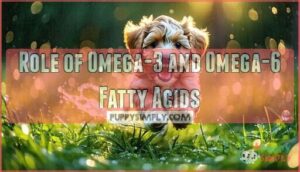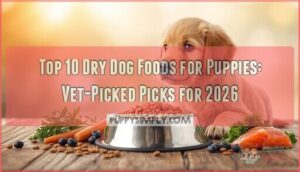This site is supported by our readers. We may earn a commission, at no cost to you, if you purchase through links.

Look for high-quality protein as the first ingredient, omega-3 fatty acids for coat health, and limited ingredients if your pup has allergies.
Top picks include grain-free options, freeze-dried raw foods, and formulas designed for medium to large breeds.
Since labradoodles inherit traits from both poodles and labs, they need balanced nutrition that supports joint health and digestive wellness.
Quality matters more than price in the context of your dog’s long-term health.
The right food choice depends on your specific dog’s age, activity level, and any dietary restrictions they might have.
Table Of Contents
- Key Takeaways
- Labradoodle Nutrition Needs
- Top 10 Best Foods
- 1. Instinct Raw Beef Dog Food
- 2. Royal Canin HP Hydrolyzed Protein
- 3. Blue Buffalo Dog Food
- 4. Hills Science Diet Dog Food
- 5. Taste Wild High Prairie Puppy Dog Food
- 6. Purina Pro Plan Chicken Rice Probiotics Dog Food
- 7. Open Farm Dog Food Stew
- 8. NUTRO Ultra Adult Dry Dog Food
- 9. ACANA Lamb Pumpkin Dog Food
- 10. Portland Pet Food Human-Grade Wet Dog Food
- Common Health Issues
- Choosing Best Food Options
- Feeding Labradoodles Right
- Frequently Asked Questions (FAQs)
- What is the best food to feed a Labradoodle?
- Should Labradoodles have grain-free food?
- What meat is best for Labradoodles?
- What can a Labradoodle not eat?
- How much should adult Labradoodles eat daily?
- Can Labradoodles eat raw food safely?
- What age to switch from puppy food?
- How often should Labradoodles be fed?
- Are supplements necessary for healthy Labradoodles?
- Conclusion
Key Takeaways
- Look for high-quality protein as the first ingredient – Real meat, like chicken, beef, or fish, should top the ingredient list to support your labradoodle’s muscle development and active lifestyle.
- Choose foods with omega-3 fatty acids and limited ingredients – These support coat health and can help if your pup has allergies or sensitivities, which labradoodles are prone to inheriting from both parent breeds.
- Avoid harmful fillers and artificial additives – Skip foods with BHA, BHT, artificial colors, corn syrup, and meat by-products that can compromise your dog’s health and digestion.
- Consider your specific dog’s needs over price – Factor in your labradoodle’s age, activity level, and any dietary restrictions when selecting food, as quality nutrition can prevent costly health issues and extend your dog’s life by over two years.
Labradoodle Nutrition Needs
Your Labradoodle needs the right balance of protein, fats, and nutrients to stay healthy and energetic.
Poor nutrition can cut your dog’s life short by over two years, so choosing quality food matters more than you think.
Importance of Balanced Nutrition
Your Labradoodle’s nutritional foundation determines their lifelong wellbeing.
Balanced nutrition directly impacts ideal growth during puppyhood and maintains energy levels throughout adulthood.
Quality labradoodle food supports immune support while promoting healthy coat quality and digestive health.
Poor labradoodle diet choices can reduce lifespan by over two years.
The best dog food combines essential proteins, fats, vitamins, and minerals, which is crucial for proper canine nutrition.
Investing in your dog’s future health and happiness is key, as it’s not just feeding—it’s about providing the necessary nutrients for a long and healthy life, which is why quality labradoodle food is essential.
Role of High-quality Protein
Protein serves as your labradoodle’s building block for muscle development and tissue repair.
High protein dog food ingredients provide the energy source your pup needs for daily activities.
Quality protein supports enzyme production and immune support functions.
When selecting labradoodle food, look for real meat as the first ingredient, which guarantees your labradoodle diet contains the high protein content necessary for ideal health and growth.
Essential Vitamins and Minerals
Your dog needs key vitamins and minerals for peak health.
Vitamin A supports immune function while calcium and phosphorus build bone strength.
B vitamins aid energy metabolism and vitamin E acts as an antioxidant.
Quality dog food for labradoodles should contain these nutrients from natural vitamin sources.
Natural vitamins offer better absorption.
Watch for deficiency symptoms like dull coats or lethargy indicating poor mineral absorption in your pet’s canine diet, which can be supported by natural vitamin sources.
Top 10 Best Foods
You’ll discover ten top-rated dog foods specifically chosen for Labradoodles’ unique nutritional needs. Each option balances protein requirements with digestive health support to keep your pup thriving.
1. Instinct Raw Beef Dog Food
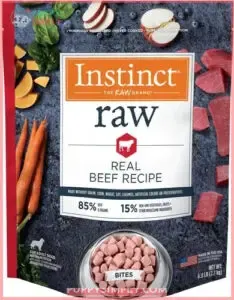
First on our list delivers raw feeding benefits without the hassle of meal prep.
This grainfree dog food uses high-quality beef sourcing that many labradoodles crave.
- Raw feeding approach – freeze-dried for convenience
- Beef quality – grass-fed protein as first ingredient
- Ingredient sourcing – minimal processing preserves nutrients
- Cost analysis – premium pricing reflects quality standards
- Palatability concerns – most dogs love the taste
2. Royal Canin HP Hydrolyzed Protein
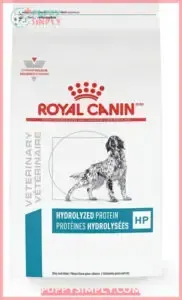
When your pup suffers from food allergies, Royal Canin HP becomes a game-changer.
This hypoallergenic dog food features hydrolyzed protein that breaks down potential allergens into tiny, unrecognizable pieces.
Your labradoodle’s immune system won’t react to these microscopic proteins.
This careful allergy management supports both skin health and gut health while maintaining excellent palatability that even picky eaters enjoy.
3. Blue Buffalo Dog Food
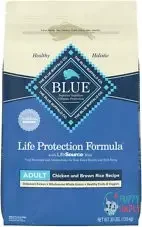
Blue Buffalo stands out among dog food recommendations with extensive product variety and life stage formulas designed for your labradoodle’s specific needs.
Their ingredient analysis reveals real meat as the first ingredient plus beneficial antioxidants.
Customer reviews consistently praise their recall history transparency and labradoodle nutrition benefits.
Multiple dog food reviews highlight Blue Buffalo’s commitment to labradoodle care through quality ingredients and detailed formulations for ideal health.
4. Hills Science Diet Dog Food
Hills Science Diet earns vet recommendations for its precise Hills Ingredients and life stage formulations.
You’ll find breed specific options that support sensitive stomachs through carefully balanced nutrition. Dog food reviews consistently praise its scientific approach to labradoodle nutrition.
This highquality dog food addresses common allergies while meeting your pup’s developmental needs perfectly. It also guarantees that the food meets AAFCO standards for nutritional adequacy, following a scientific approach to ensure nutritional adequacy.
5. Taste Wild High Prairie Puppy Dog Food

Taste Wild High Prairie Puppy Dog Food offers premium protein sources from buffalo, lamb meal, and chicken meal.
This grainfree food supports puppy development with balanced nutrition. The wild taste appeals to picky eaters while providing digestive support for sensitive stomach issues.
- High-quality protein sources from real buffalo and lamb meal support growing muscles
- Probiotics benefits include improved digestion and immune system development
- Puppy development formula provides DHA for brain and eye growth
- Ingredient analysis shows no grains, corn, or wheat for allergy formula needs
- Specialized nutrition designed specifically as dog food for puppies under 12 months
6. Purina Pro Plan Chicken Rice Probiotics Dog Food

Choosing dog food with probiotics benefits your Labradoodle’s digestive health substantially.
Purina Pro Plan features real chicken quality as the first ingredient plus brown rice digestion support.
This formula promotes skin health and coat shine while being gentle on sensitive stomachs.
Dog food reviews consistently praise this option for Labradoodles with allergies, making it a reliable choice for your pup’s nutritional needs, and it is a good example of a food that supports digestive health.
7. Open Farm Dog Food Stew
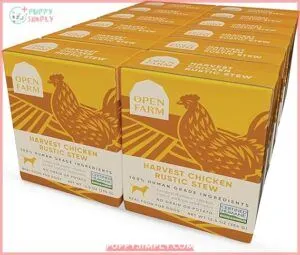
Open Farm’s beef-and-vegetable stew delivers restaurant-quality nutrition in convenient packaging.
This human-grade formula meets AAFCO standards with 8% protein and traceable ingredients from Australia and the US. You’ll find certified humane beef, non-GMO vegetables, and prebiotics supporting digestive health.
The grain-free recipe works well for sensitive stomachs, though it’s pricier than average options. Many owners report shinier coats and improved energy levels in their Labradoodles, thanks to the human-grade formula.
Best For: Owners seeking premium, human-grade nutrition for dogs with sensitive stomachs or special dietary needs.
- High-quality, traceable ingredients with certified humane beef and non-GMO vegetables.
- Grain-free formula with prebiotics and probiotics for digestive and skin health.
- Strong user feedback on improved coat shine, energy, and allergy relief.
- Above-average price compared to typical dog food options.
- Mushy, watery texture may not work as a standalone meal for all dogs.
- Packaging can be wasteful and difficult to fully empty.
8. NUTRO Ultra Adult Dry Dog Food
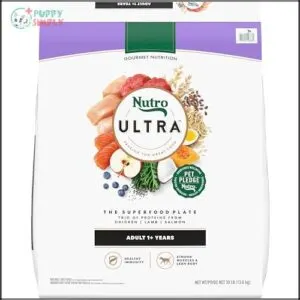
NUTRO Ultra delivers premium nutrition with real chicken as its first ingredient.
This formula combines three protein sources—chicken, lamb, and salmon—to support your Labradoodle’s muscle development.
The recipe includes 14 superfoods like blueberries and spinach for antioxidant support.
You’ll find omega-3 and omega-6 fatty acids that promote healthy skin and coat shine.
It’s made without corn, wheat, or soy, reducing potential allergens.
Many owners report improved digestion and energy levels in their dogs, thanks to the premium nutrition and antioxidant support.
Best For: Owners of adult dogs, especially Labradoodles, who want premium nutrition with multiple high-quality animal proteins and superfood ingredients for muscle, coat, and digestive health.
- Trio of real animal proteins (chicken, lamb, salmon) supports strong muscles and lean body.
- Includes superfoods and omega fatty acids for coat shine, immune, and digestive health.
- Free from corn, wheat, soy, and artificial additives; non-GMO ingredients for cleaner nutrition.
- Price may be higher than other dog food brands, which could be a concern for budget-conscious owners.
- Picky eaters might need the food mixed with wet food or toppers to encourage eating.
- Some dogs may require a transition period to prevent digestive issues when switching to this formula.
9. ACANA Lamb Pumpkin Dog Food
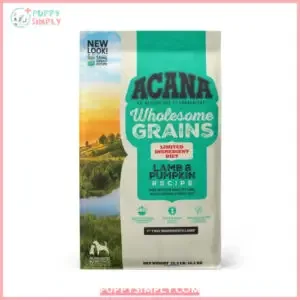
ACANA Lamb & Pumpkin delivers premium nutrition with 60% quality animal ingredients and wholesome grains.
You’ll appreciate the single-source lamb protein that’s perfect for sensitive stomachs. This recipe includes natural omega fatty acids for a shiny coat and prebiotics for digestive health.
The 27% protein content supports your Labradoodle’s active lifestyle. While it’s pricier than some options, the limited ingredient formula excludes common allergens like corn and wheat.
Your pup gets glucosamine for joint support too, and the inclusion of natural ingredients like pumpkin provides additional health benefits.
Best For: Dogs with sensitive stomachs or allergies who benefit from a limited-ingredient, high-protein diet with wholesome grains.
- Single-source lamb protein supports sensitive digestion and minimizes allergy risks.
- Contains natural omega fatty acids and glucosamine for skin, coat, and joint health.
- Excludes common allergens like corn, wheat, soy, peas, and artificial additives.
- Higher price point compared to many mainstream dog foods.
- Not recommended for the growth of large breed puppies (over 70 lbs as adults).
- Some owners report the fish variety may have a strong smell.
10. Portland Pet Food Human-Grade Wet Dog Food
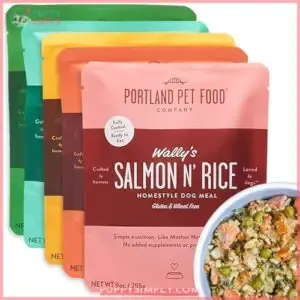
Coming from years of pet food innovation, Portland Pet Food delivers human-grade wet meals that’ll make your Labradoodle’s tail wag.
These shelf-stable pouches contain just 11 ingredients or fewer, sourced entirely from American farms. Your pup gets real meat as the first ingredient without preservatives or fillers.
The variety pack offers five flavors including salmon, beef, and turkey. While some dogs experienced digestive upset, most owners report their picky eaters finally clean their bowls completely, which can be a welcome change.
Best For: Owners seeking human-grade, limited-ingredient wet food for picky or sensitive Labradoodles and those wanting to supplement with premium nutrition.
- Transparent, human-grade ingredients sourced from the USA, with no fillers or preservatives.
- Highly palatable; even picky eaters and senior dogs enjoy the taste and texture.
- Shelf-stable, easy-to-serve pouches require no refrigeration or thawing.
- Pricier than conventional or feed-grade dog food options.
- Some flavors (especially rice-based) may cause digestive upset in sensitive dogs.
- Not intended as a complete daily diet for all dogs; best used as a topper or supplement.
Common Health Issues
Your Labradoodle might face specific health challenges that require careful food choices. Understanding these common issues helps you pick the right nutrition to keep your pup healthy and happy.
Food Allergies and Sensitivities
After choosing the right food, you’ll need to watch for food allergies and sensitivities in your Labradoodle. These issues affect 10-20% of dogs, with Labradoodles being particularly prone to reactions.
Labradoodles are often considered hypoallergenic, but no dog breed is completely allergy-free.
Common allergy symptoms include:
- Persistent itching of feet, face, and ears
- Recurring ear infections and skin redness
- Digestive problems like diarrhea or vomiting
- Hair loss and chronic skin infections
Beef causes reactions in 34% of affected dogs, followed by chicken at 15%. An elimination diet helps identify triggers. Novel proteins and limited ingredient diets work well for dogs with ingredient intolerance.
Hip and Joint Issues
Labradoodles face higher risks for hip dysplasia and joint problems due to breed predisposition from both parent breeds.
Early detection through regular vet checkups helps catch issues before they worsen. Weight management and controlled exercise impact joint health substantially. High-quality dog food for large breeds with joint supplements supports mobility and comfort throughout their adult years.
Labradoodles are also prone to progressive retinal atrophy, a heritable eye condition.
| Joint Health Factor | Impact on Labradoodles |
|---|---|
| Hip Dysplasia Risk | Higher due to genetics from both breeds |
| Weight Control | Reduces joint stress and arthritis progression |
| Exercise Needs | Low-impact activities protect developing joints |
Digestive Health Problems
Beyond joint concerns, your Labradoodle’s tummy troubles need attention too. Sensitive stomachs plague many doodles, making high-quality dog food for digestive health essential.
The gut microbiome thrives with proper pet nutrition including:
- Probiotic benefits from live cultures
- Enzyme supplements for better breakdown
- Dietary fiber for regularity
- Dog food for allergies protection
- Dog food for sensitive stomachs formulation
Some breeds are also prone to bloat and GDV, a life-threatening condition that requires immediate attention to prevent serious harm, emphasizing the need for proper pet nutrition.
Choosing Best Food Options
When choosing food for your Labradoodle, you’ll need to take into account any dietary restrictions your pup might have.
The right food can prevent allergies and support their active lifestyle while keeping their coat shiny and healthy, which is crucial for a Labradoodle’s overall well-being, particularly in maintaining a healthy coat.
Consideration of Dietary Restrictions
Some dogs face ingredient intolerance that makes choosing highquality dog food challenging.
Limited ingredients diets help identify problem foods through elimination trials.
Novel proteins like duck or venison work well for sensitive stomachs.
Hypoallergenic diets reduce reactions while maintaining proper pet nutrition.
Consider dog food for allergies when standard ingredients cause issues, using hypoallergenic diets as an option.
Importance of Grain-free Diets
Grain-free diets offer significant benefits for Labradoodles with specific sensitivities.
These natural dog food options reduce allergy symptoms like itchy skin and digestive upset.
Many owners report improved digestion and better energy levels after switching.
For owners seeking alternatives, it’s important to research the best options.
However, grain-free diets aren’t necessary for all dogs.
Recent studies link some grain-free formulas to heart issues, so consult your vet before making changes to ensure the best outcome for your Labradoodles with specific needs.
Role of Omega-3 and Omega-6 Fatty Acids
These essential fatty acids work like your dog’s internal maintenance crew.
Omega-3 and omega-6 fatty acids support skin and coat health while promoting brain development in growing pups.
Quality dog food containing these nutrients helps with joint health and inflammation control.
Natural dog food sources like fish oil provide immune support.
Dogs with sensitive stomachs often benefit from balanced omega ratios that maintain healthy coat shine and overall dog health.
Feeding Labradoodles Right
You’ll want to avoid dog foods with harmful fillers, artificial preservatives, and low-quality protein sources that can damage your Labradoodle’s health.
Choosing human-grade ingredients and following proper switch methods guarantees your pup gets superior nutrition while avoiding digestive upset.
What to Avoid in Dog Food
Avoid dog food with Harmful Additives like BHA, BHT, and ethoxyquin.
Skip products containing Artificial Colors and Excessive Fillers such as corn syrup or wheat gluten.
Watch for Toxic Ingredients including onion powder and garlic.
Low-Quality Protein sources like "meat by-products" offer poor nutrition.
These ingredients compromise dog health and create digestive issues for sensitive stomachs.
Benefits of Human-grade Ingredients
Human-grade ingredients offer real advantages for your Labradoodle’s health.
These foods provide Enhanced Nutrition through minimal processing that preserves natural vitamins and minerals.
Your dog gets Higher Bioavailability with up to 66% better nutrient absorption compared to regular kibble.
Better Palatability means picky eaters actually enjoy mealtime.
Improved Digestion leads to firmer stools and less waste.
For dogs with food sensitivities, human-grade options support Allergy Reduction through cleaner ingredient lists and stricter quality control standards.
Tips for Transitioning to New Food
Switching your Labradoodle’s food doesn’t have to stress you out. Smart pet parents know that rushing the process can upset your dog’s stomach and create bigger problems down the road.
Ensuring a balanced diet can be achieved through homemade food options.
- Start with gradual introduction: Mix 25% new food with 75% current food for days 1-2, then gradually increase new food ratios over 7-10 days
- Monitor stool quality and watch for allergy signs: Look for loose stools, vomiting, or skin irritation that might indicate palatability issues with the new dog food
- Research best dog food brands beforehand: Read food reviews and choose dog food for mixed breeds or dog food for sensitive stomachs if needed
Frequently Asked Questions (FAQs)
What is the best food to feed a Labradoodle?
You should feed your Labradoodle high-quality dog food with at least 18% protein and 5% fat. Science Diet, Purina Pro Plan, and Royal Canin offer excellent nutritional oversight and quality.
Should Labradoodles have grain-free food?
Grain-free isn’t necessary for most Labradoodles unless they’ve specific allergies.
Many dogs thrive on quality foods with grains like rice and oats, which provide beneficial nutrients and fiber for healthy digestion.
They can be a good option for dogs without specific dietary needs or allergies.
What meat is best for Labradoodles?
Beef, chicken, and fish work well for most Labradoodles.
These proteins support muscle development and provide essential amino acids.
You’ll want to choose high-quality sources as the first ingredient in your dog’s food.
What can a Labradoodle not eat?
Your Labradoodle can’t eat chocolate, grapes, raisins, onions, garlic, avocado, xylitol sweetener, macadamia nuts, alcohol, or cooked bones.
These foods cause serious health problems including poisoning, kidney failure, and digestive blockages that require emergency vet care.
How much should adult Labradoodles eat daily?
Adult Labradoodles need 5-3 cups of high-quality dry food daily, split into two meals.
You’ll adjust portions based on your dog’s size, activity level, and metabolism.
Monitor weight and consult your vet for personalized feeding recommendations.
Can Labradoodles eat raw food safely?
Yes, you can feed your Labradoodle raw food safely with proper planning.
However, raw diets pose bacterial contamination risks and require careful nutritional balancing.
You’ll need veterinary guidance to guarantee safety.
What age to switch from puppy food?
Like a toddler graduating from milk to solid food, your Labradoodle should switch from puppy to adult food around 12-18 months when their growth plates close and energy needs stabilize.
How often should Labradoodles be fed?
Adult Labradoodles should eat twice daily with meals spaced 8-12 hours apart. This schedule prevents bloat, maintains steady energy levels, and supports healthy digestion throughout the day.
Are supplements necessary for healthy Labradoodles?
Think of supplements as insurance policies for your dog’s health journey.
Most healthy Labradoodles don’t need supplements if they’re eating quality food.
However, joint support, omega-3s, or probiotics might help specific issues.
Consult your vet first.
Conclusion
Consider Sarah’s 2-year-old labradoodle Max who struggled with itchy skin until she switched to a limited ingredient formula with salmon and sweet potato.
His coat became shinier and scratching stopped within weeks.
Choosing the best dog food for labradoodles requires matching your pup’s specific needs with quality ingredients. Focus on protein-rich formulas with omega fatty acids for coat health.
Avoid fillers and artificial additives. Remember that premium nutrition prevents costly health issues later.
Your labradoodle deserves food that supports their active lifestyle and unique genetic makeup from both parent breeds.






